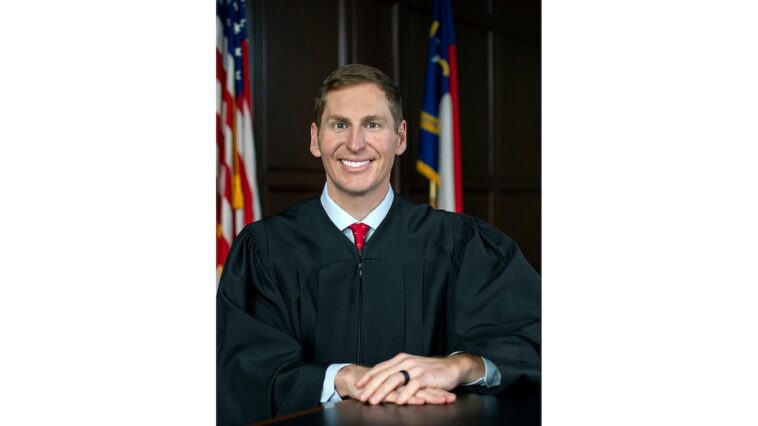
North Carolina Supreme Court’s Dismissal: An Antecedent Underlining the Bitter Contest of Ballots
The Rustling in the North Carolina Supreme Court
The North Carolina Supreme Court has made a landmark decision, dismissing a petition by the contender, Jefferson Griffin, who trails in a narrow race for a seat on the very same court. His plea was to provide an immediate determination on whether to eliminate roughly 60,000 ballots from the overall vote count. This choice of the court fuels a perennial issue: the balance between the right to vote and the maintenance of election integrity, particularly in close races.
Recounting Effect on the Legal Court Race Outcomes
Since the day of Election Two and a half months ago, this seemingly interminable contest has seen recounts, election board hearings, and the dismissal of Griffin’s election protests. Current Associate Justice, Allison Riggs, a Democratic ally, has managed to stay ahead of Griffin, a judge on the intermediate-level Court of Appeals, even after recounts and a tense fight over the validity of roughly sixty thousand votes.
The Call for a ‘Writ of Prohibition’—An Exceptional Legal Tool
The Republican candidate, Griffin, pursued to have the tally scrutinized by filing for what’s technically called a ‘writ of prohibition.’ The unanimous decision to dismiss Griffin’s petition among the six presiding justices (given Justice Riggs recused herself, keeping conflict of interest at bay), marks the core of the issue of using writs as “extraordinary” legal tools in election cases. As this unfolds, we are brought back to the question: What is the line between a rightful inquisition into election irregularities and trying to overthrow the result of a democratic election?
The Importance of Expedited Legal Decisions
The court order goes on to emphasize the need for the Wake County court to act swiftly in addressing Griffin’s appeals. This urgency is reflected in the general populous, who, having participated in the electoral process, are left waiting for an ultimate verdict on who would serve as their representative.
Use of Legal Channels and the Role of Federal Courts
The dismissal of the Supreme Court’s petition does not end the legal tussle over this contentious seat. In fact, scheduled oral arguments await the 4th U.S. Circuit Court of Appeals. It marks one of the instances where federal courts are drawn into the state-level turbulences — to decide whether they have the authority to review the dispute over 66,000 challenged ballots. Griffin’s lawyers insist that the controversy needs to be resolved in state court, while Riggs and the board argue it involves federal voting rights and election laws.
State Registration and Residency Laws in North Carolina’s Election Contests
What adds to the complexity of the situation is the contention surrounding state registration, residency, and photo identification laws. Griffin’s lawyers believe these laws were overlooked in relation to contested absentee or early votes. With such meticulous scrutiny of the electoral process, the case further throws light on the implications of registration and residency laws in impacting election outcomes.
Questioning The Validity of Votes and Its Implications on Democracy
Riggs has refuted these claims, arguing that the questioned votes were lawful and the real issue resides in Griffin’s attempt to overturn election results ex post facto. Here, we are observing two contrasting takes on the responsibility of courts and election boards to uphold the rights of voters. It’s a potent example of how contested ballots can prove to be game-changers in an election, its outcome largely teetering on the decisions of courtrooms.
Public Opinion and Voters Rights in Election Contests
Griffin’s dwindling advantage from Election Night, followed by Riggs seizing the lead, does induce skepticism among North Carolina’s voters. As tensions escalate, the legal right to inquire into election outcomes becomes just as critical for maintaining public trust in the democratic process as ensuring the validation of lawful ballots and the rights of voters. The overall scenario offers valuable insights into the role of public opinion and the protection of voters’ rights in election disputes.
Unsettling Times Ahead Questions Authenticity of Election Outcomes
Looking at this particular case of the North Carolina Supreme Court, it becomes clear that close race outcomes can lead to prolonged legal battles, each party doing their best to grow their influence over a given seat. With recounts, appeals, and now a potential path into federal court, the authenticity of the election and the ensuing processes is put to the test, leaving room for uncertain and, potentially, unsettling times ahead.
Originally Post From https://abcnews.go.com/Politics/wireStory/north-carolina-supreme-court-passing-now-ruling-ballots-118007052


